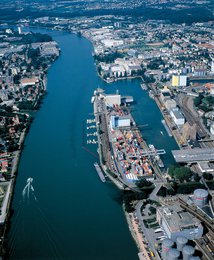Cross-border economic development
Added value of cooperation
Public- and private-sector actors are in a complex interplay between competition and cooperation on either side of the border. The principle issue is the need to move from a state of pure competition to one of "co-opetition", combining cooperation and competition.
A situation based on a rapprochement with the neighbour, because they can provide what is lacking in the development. There is a lack of awareness of the fact that cross-border economic development can generate added value for the whole territory. To enable the provision of adequate tools for economic actors, their awareness of this fact needs to be raised, in order to overcome mutual mistrust between economic actors at the local level one of the major obstacles to cooperation in a predominantly competitive context.
Two approaches can lead to cooperation: the logic of complementarity, and the logic of economies of scale.
The complementarity RATIONALE
On a border where two or three States with different systems meet, businesses have the possibility of taking advantage of complementarity, "taking the best" from each national system (legal, administrative, etc.). What seems at first to be an obstacle is also an opportunity: companies can take advantage of differences by choosing the right system for their needs (a company locating its service functions on one side of the border and its logistics functions on the other side, as can be observed in the region of Greater Copenhagen, between Copenhagen and Malmö), or by exploiting the multicultural or multilingual potential of the territory. The disparity of economic forces and the differing economic and industrial fabric between the two sides of the border can thus become an asset.
Nevertheless, this does not solve the problem of the expenses incurred by the municipalities that have to fund public policies for inhabitants, and this without the fiscal resources often linked to economic activity. Fiscal agreements exist between some states (for example, the mechanisms for refunds from the Canton of Geneva to the neighbouring French departments), but this is not always the case. Moreover, the issue does not only concern border territories (as demonstrated by the example of workers from the Baltic countries working in the United Kingdom and commuting weekly from their home countries). This therefore raises the question of greater fiscal coordination between States at the European level.
The economies of scale rationale
The second rationale that can incite actors to cooperate is that of economies of scale. Cross-border cooperation "enlarges" the territory for inhabitants and businesses, allowing economies of scale to come into play in terms of market size, infrastructure and public services. The same principle applies to SMEs.
One of the most important benefits is the splitting of investment costs between partners in terms of infrastructure, laboratories etc., that are often very expensive in innovative sectors. This shared increase in capacity is all the more necessary for conquering local, European and global markets.
In addition, joint marketing of businesses and a joint presence at international fairs can raise profiles while sharing costs.
These economies of scale can be applied to cross-border sectoral clusters, bringing together all of the actors concerned. By looking beyond the local context, cross-border cooperation can bring about a "win-win" situation for border territories, for their businesses and their inhabitants.
With regard to investment in cross-border public services and facilities, appropriate financial and governance tools exist, and must continue to be promoted: EGTCs, Interreg projects, complementarity between the European Structural and Investment Funds, tools made available by national development banks and the European Investment Bank such as investment platforms, the grouping of projects, etc. (see the event held by the MOT in 2016 on cross-border investment)
By looking beyond the local context, cross-border cooperation can bring about a "win-win" situation for border territories, for their businesses and their inhabitants.


